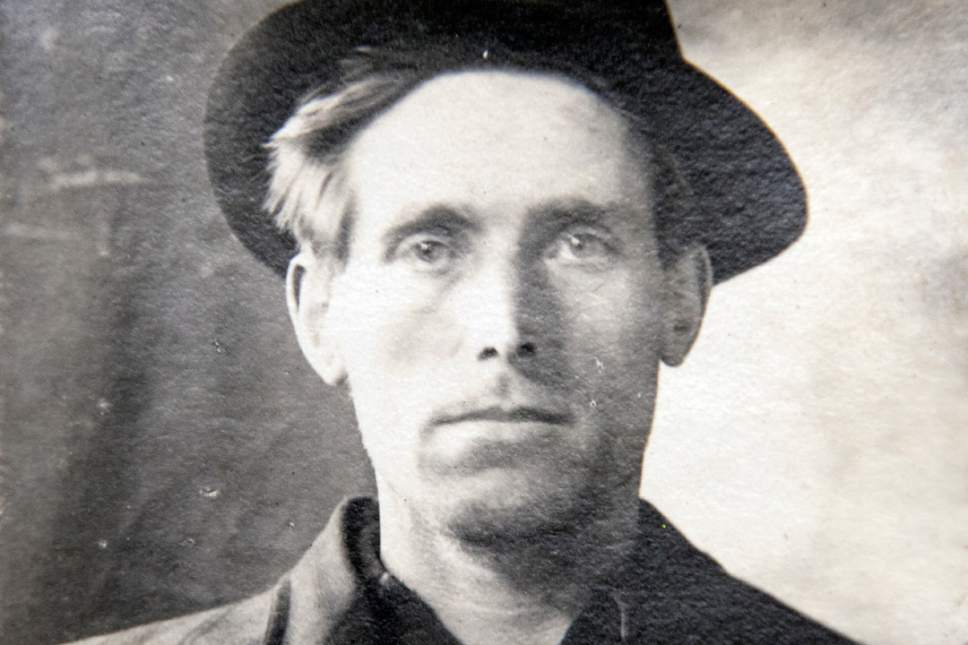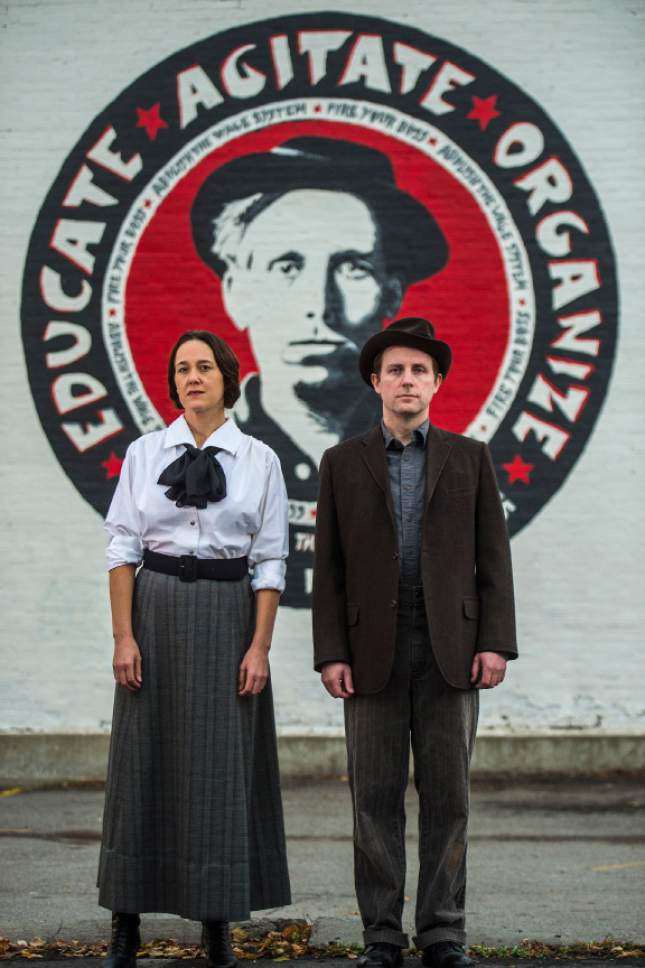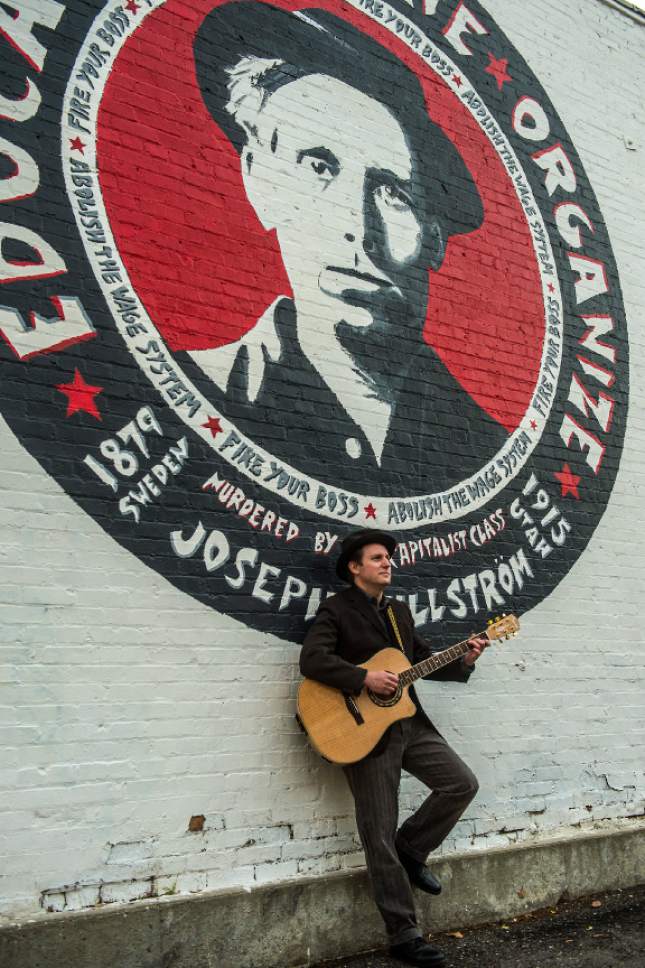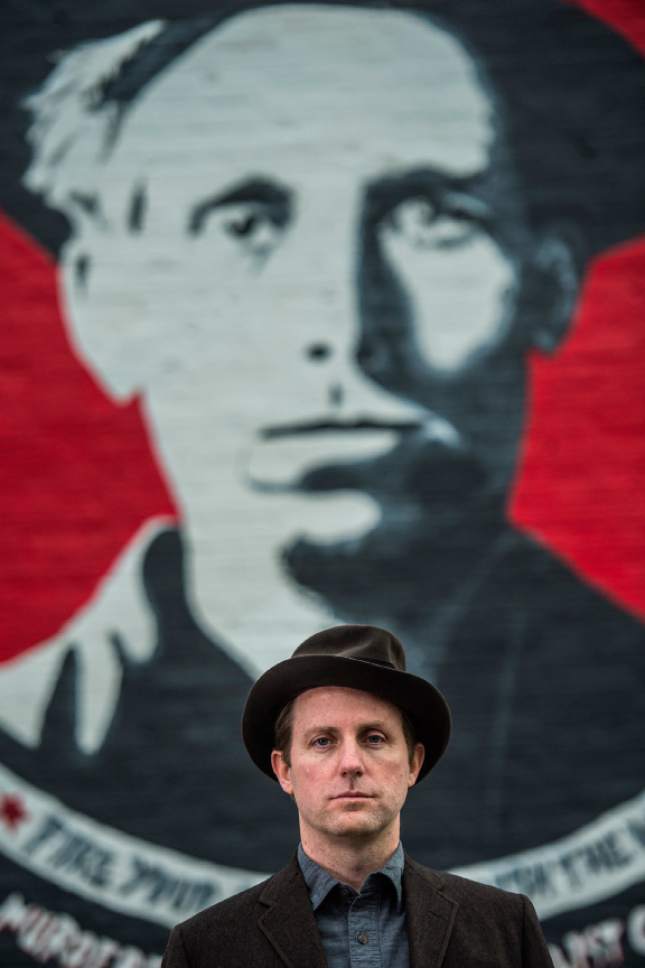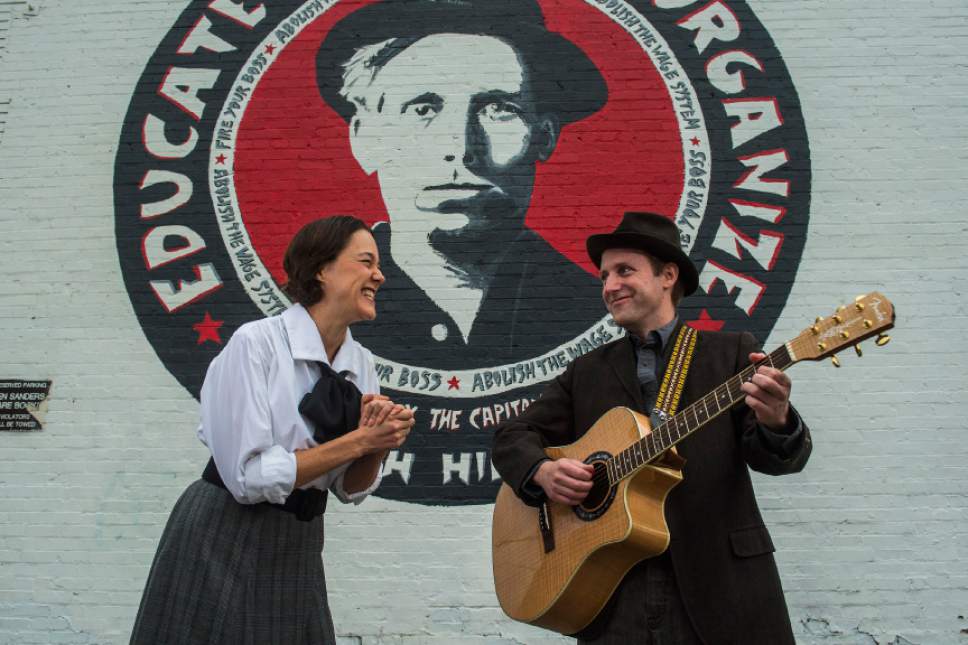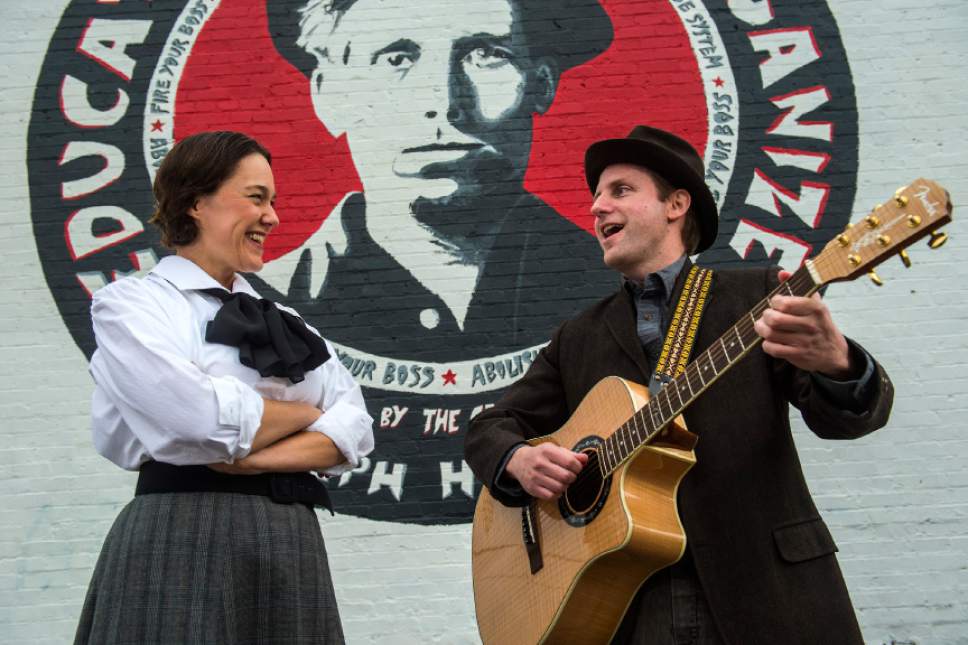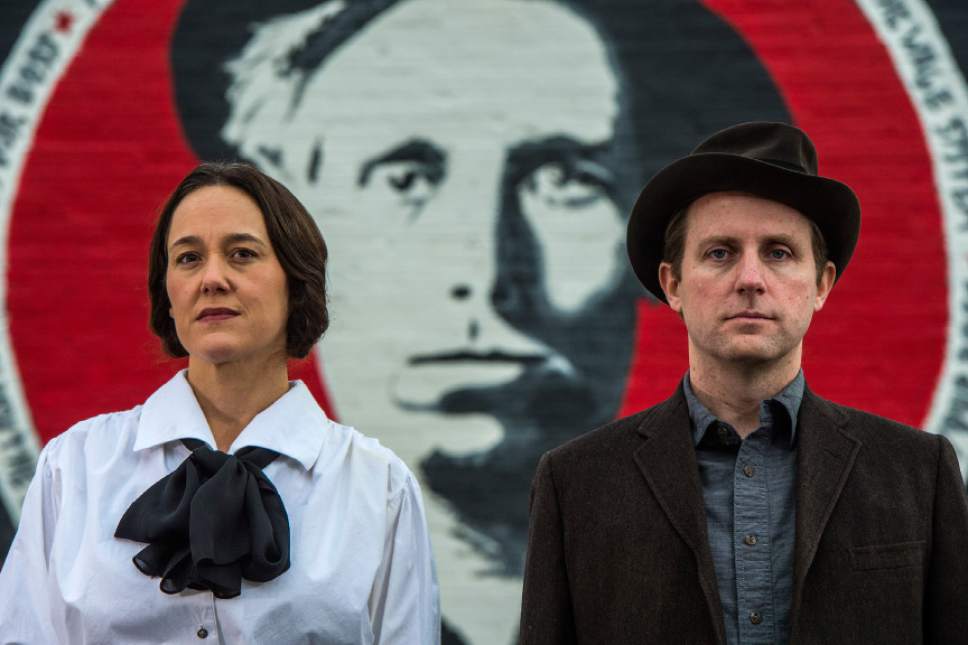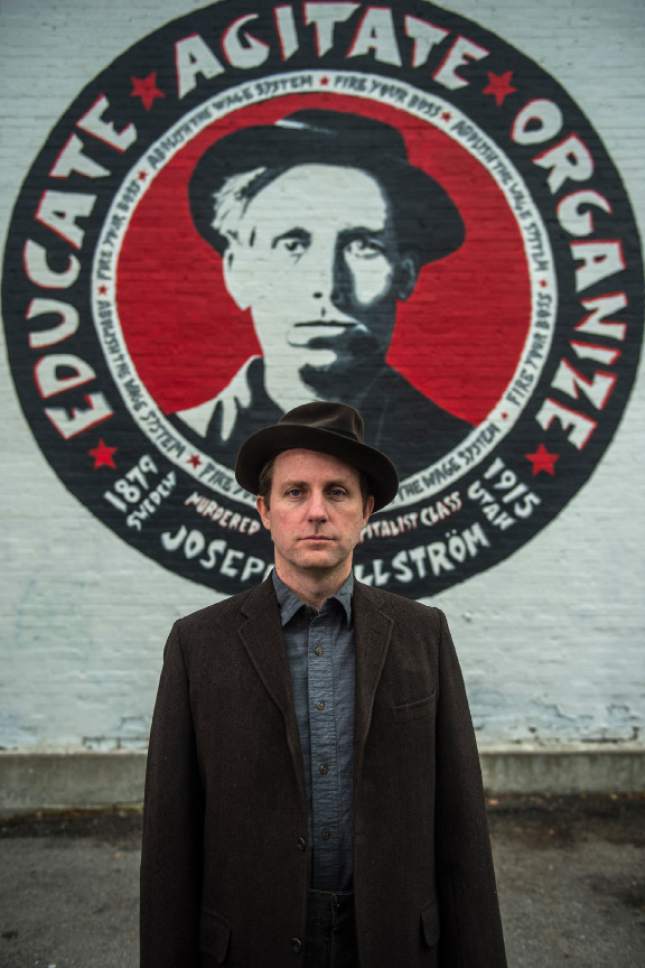This is an archived article that was published on sltrib.com in 2016, and information in the article may be outdated. It is provided only for personal research purposes and may not be reprinted.
Consider it dramatic magic: The longer playwright Debora Threedy watches Roger Dunbar rehearse the role of Joe Hill, the more she thinks the actor resembles historical photos of Utah's most notorious union organizer.
"I swear he's starting to look like Joe Hill. It's actually a little spooky," Threedy says, underscoring the actor's onstage portrayal combining idealism and innocence. "He certainly has brought to life the Joe Hill I had in my head, which as a playwright is all you can ask."
Dunbar downplays the idea of a physical connection, saying he's shorter than Hill, and descended from British roots, not Swedish. But in his portrayal, he has drawn upon the labor organizer's steady, sometimes taciturn personality, as well as his passionate activism. "Those elements of his drive I find very fascinating, and I've tried to tap into," says Dunbar, who performed the character at a workshop last year and then at a staged reading at Utah Shakespeare Festival in August.
Hill was a songwriter and an organizer for the Industrial Workers of the World, known as the Wobblies. On Nov. 19, 1915, the 33-year-old was executed by a Utah firing squad at the state prison after being convicted of the murder of a Salt Lake grocer. Hill's simple protest songs, which have influenced musicians ranging from Woody Guthrie to Bruce Springsteen, have helped to keep his memory alive.
On the 101st anniversary of that execution, Hill's story will get another chapter in Plan-B Theatre's production of Threedy's "One Big Union." The world-premiere run plays Nov. 10-20 at Salt Lake City's Rose Wagner Performing Arts Center, about five blocks from the site of the store where grocer John G. Morrison and his son were shot and killed on a cold Saturday night Jan. 10, 1914.
Threedy mined Hill's history to unfold a story about his songs, his trial and execution, as well as the women who inspired him, including his prison penpal Elizabeth Gurley Flynn, played by Tracie Merrill. Hill is remembered for his simple, yet often irreverent lyrics. "How I explain them to people is he was writing the 'Saturday's Voyeur' of the 1910s," crafting new lyrics set to popular melodies, Threedy says.
In letters, Hill wrote Flynn that he was dedicating his song "Rebel Girl" to her, labeling her the original rebel girl. Historians might challenge that notion, as Hill had written the song years before he briefly met Flynn in his prison cell.
But for the playwright, their brief meeting offered dramatic material. "From my point of view, he claimed her," Threedy says. (See a contemporary cover by Utah singer Alyeah Hansen at the top of this story.) "She's the agent that makes Joe start thinking about being a martyr, which is ironic because she was trying to talk him out of being a martyr."
In Threedy's telling, it's the character's passion that makes her so crucial to the story, and that's what Merrill is bringing to the role. "Merrill gets her passion about the movement and her passion about Joe."
In her day job, Threedy is a law professor who will retire from the University of Utah in December. And so she was understandably fascinated by how Hill's defense was bungled. "Whether he was guilty or not, I don't know the answer to that, nobody does," she says. "But I do know that he didn't have a fair trial. That's the piece that I thought as a lawyer I could best bring to the stage."
Hill had better legal instincts then either of his two lawyers, one a crook who was later disbarred, the other incredibly inexperienced. "He might have gotten a legal trial, but I don't think he got a fair trial," Threedy says.
It's the second of Threedy's plays inspired by romantic Utah legends, a sort of companion piece to Plan-B's 2008 "The End of the Horizon," about the boy-poet Everett Ruess, who disappeared into the wilds of Utah in 1934. "I certainly believe strongly in telling the stories of where you are," she says, adding that she hadn't heard of either Ruess or Hill until after she moved to Utah. "I really enjoy retelling historical events. I don't think I'm going to stop doing that anytime soon."
In "One Big Union," scenes are woven together through a composite character, the Working Stiff, played by Carleton Bluford, who serves as the story's narrator.
The play incorporates Hill's songs in stage numbers that draw upon choreographer Stephanie Howell's training as a professional contemporary dancer. The goal is to feel like these people have decided spontaneously to sing together at a union meeting. "It's a join-in kind of singing, a sing-along kind of singing," says Jerry Rapier, Plan-B's artistic director.
For Dunbar and the show's director, Jason Bowcutt, exploring a historically based story that wasn't taught in their Utah history classes is one of the fascinations of "One Big Union." "I feel a little bit ashamed of myself that I didn't know about him," Dunbar says. "I wonder what else I don't know about the history of the state and the culture."
Studying the history of "One Big Union" has changed his perception of his home state, Bowcutt says. "It's great history and it's great theater. You combine these two things and it's a great night."
facebook.com/ellen.weist —
Plan-B Theatre's 'One Big Union'
Playwright Debora Threedy's story about Joe Hill features Roger Dunbar as the songwriting union organizer, with Tracie Merrill as "Rebel Girl" Elizabeth Gurley Flynn. The cast also includes Daniel Beecher, Carleton Bluford, April Fossen and Jay Perry. The production is directed by Jason Bowcutt, choreography by Stephanie Howell, and musical direction by Dave Evanoff.
Where • Rose Wagner Performing Arts Center's Studio Theatre, 138 W. 300 South, Salt Lake City
When • The initial run of Nov. 10-20 (Thursday at 8 p.m., Saturday at 4 and 8 p.m., Sunday at 2 and 5:30 p.m.) is mostly sold out; limited tickets are available for Sunday shows Nov. 13 and 20 at 5:30 p.m.
Wait list • A prepaid wait list will begin one hour before showtime in the Rose Wagner box office. Patrons must be present to be added to the list. Full refunds will be given immediately to those not seated at showtime.
Note • No late seating
Tickets • $20, 801-355-2787 or planbtheatre.org/ticketsgiving
Entrada Institute • A benefit performance will be offered Wednesday, Nov. 9; doors open at 6:45 p.m.; show at 7 p.m.
Fundraiser tickets • $100 at entradainstitute.org/onebigunion —
Joe Hill's musical legacy
Joe Hill, a labor organizer, became a famed songwriter for the Industrial Workers of the World, known as the Wobblies. He was a Swedish immigrant who worked as a laborer around the West, settling briefly for a time in Utah, where he was convicted of murder and executed by a firing squad in 1915.
But his songs live on, according to a story by Jeremy Harmon, part of the Tribune's yearlong project exploring Hill's legacy, which includes contemporary cover versions performed by Utah musicians.
The union's songs, published in its iconic Little Red Songbook, empowered workers from cultures around the globe, giving them a defiant unified voice for protest, for fellowship and for propaganda.
Hill's songs were simple and pointed, aimed at exposing injustice and forcing exploited workers to, in the language of today's Black Lives Matter movement, "stay woke."
An IWW rally in Salt Lake City on Aug. 12, 1913, began with about 500 people singing Joe Hill's song with the scornful lyrics, "Mr. Block," at 100 South and Regent Street, across the street from what is now the Cheesecake Factory at City Creek Mall. It ended in a riot; several people were shot after security guards for Utah Copper attacked an IWW speaker.
The next day, IWW strikers were singing "Mr. Block" in the hop fields of California's Durst Ranch. When law enforcement arrived, two workers and two county officials were killed in the confrontation.
The inciting power of Hill's writing is what made his songs significant, said American folk singer John McCutcheon, who recently recorded an album of Hill's IWW songs.
" 'American Idol' is a lot of people's entree to what it means to be a musician," McCutcheon said. "It's so antithetical to what Hill's life and work was all about that I think it makes him all the more important."
More • Visit local.sltrib.com/charts/joehill/landingpage.html
Also • Tribune photo director Jeremy Harmon will summarize his original research regarding Wallace Stegner's 1950 novel, "Joe Hill," as well as the work of another writer, Aubrey Haan, who was also working on a novel about the labor organizer. From historical records, Stegner and Haan came to different conclusions about Hill's story.
When • Monday, Nov. 14, 6 p.m.
Where • Marriott Library's Gould Auditorium, University of Utah campus
Registration • eventregistration.tools.lib.utah.edu/events/joe-hill-lecture-series-part-2/
Info • adriana.parker@utah.edu or 801-585-9245


